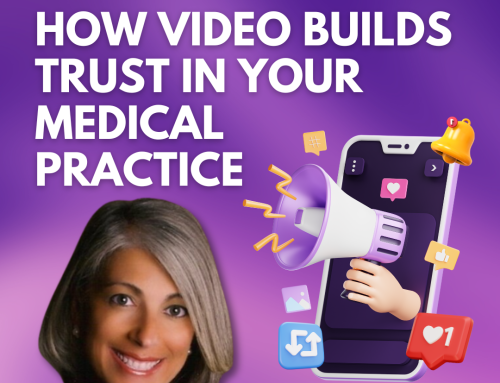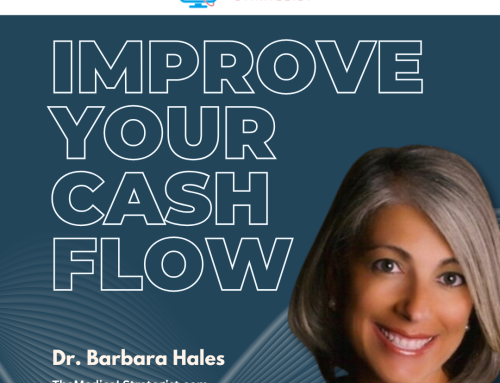Podcast: Play in new window | Download
Subscribe: RSS
In this episode, Barbara and Paul discuss:
-Why people should own their own place instead of renting
-How Commercial Financial Solutions help businesses grow and expand their businesses
-How does Vantage Point Commercial Capital promote its brand, increase its visibility, and stand out against competitors
Key Takeaways:
“I’m a serial entrepreneur at heart. All of my spheres of influence are business owners and entrepreneurs. I spend my time and energy adding value to those people from a business standpoint, giving them insight, advice, direction, be a sounding board, helping them grow and overcome any specific challenges they may be facing.” – Paul Neal
Connect with Paul Neal:
Website: https://vpc.capital/
LinkedIn: linkedin.com/in/paul-neal-47b8478
YouTube: https://www.youtube.com/@vantagepointcommercialcapi2419/
Connect with Barbara Hales:
Twitter: @DrBarbaraHales
Facebook: facebook.com/theMedicalStrategist
Business website: www.TheMedicalStrategist.com
Email: Barbara@barbarahalesmd.com
YouTube: https://www.youtube.com/TheMedicalStrategist
LinkedIn: www.linkedin.com/in/barbarahales
Books:
Content Copy Made Easy
14 Tactics to Triple Sales
Power to the Patient: The Medical Strategist
TRANSCRIPTION (126)
Dr. Barbara Hales: Welcome to another episode of Marketing Tips for Doctors. I’m your host, Dr. Barbara Hales. Today, we have with us a special guest. It is none other than Paul Neal, the founder and principal funding strategist at Vantage Point Commercial Capital, which focuses on helping entrepreneurs and real estate investors win by funding their growth and dreams in non-traditional ways. Welcome to the show, Paul.
Paul Neal: Thank you, Barbara. I’m excited about being here with you today.
Owning vs. Renting
Dr. Barbara Hales: Paul, you mentioned that you help entrepreneurs in terms of their office space. Tell me, why should people own their own place instead of renting?
Paul Neal: That’s a great question, Barbara. If you have a local business in an area, and it’s operating, and you’ve established that business and you have a pretty solid projected future, the question I always ask business owners and entrepreneurs in that scenario is, why do they own the home that they live in? There are a lot of common reasons why you do that – you want to control the home, you want to decorate it, you want a place to call your own, you want to build equity, you want to get the tax advantages of owning a home. At some point, you may use that home if you move, as a retirement investment, as an investment property, or realize a capital gain when you sell. There are a lot of similarities if you own your own business. We can look at some of the same reasons why you should own the building you’re in, just like the decisions you’ve already made to buy your house. There are tax reasons. There are control aspects. You’re building tangible value and equity. Your business can be worth more with real estate associated with it. You can build a retirement income stream out of that property. There are a whole host of reasons, but that’s the high-level reasons why entrepreneurs should buy the building.
Funding Solutions for Businesses
Dr. Barbara Hales: Do you have any suggestions on how they should fund that?
Paul Neal: There are many misconceptions about how to fund it. I think that’s one of the reasons why entrepreneurs, business owners, professionals, doctors, dentists, and so forth don’t make the plunge initially or delay or maybe never buy. In some cases, they’ll generally go to the local banks and most local banks will want a large down payment, a 20 – 25% down payment, and fairly confiscatory terms if we talk about loan covenants, deposits, and things like that. From most people’s perspective, it’s for a local entrepreneur who is busy running their business, not a finance person. It can be a problematic concern. If you’re going to buy a $2 million building and you need a 20% down payment, $400,000 is a lot of money to take out of your operating account and plunk down on a piece of real estate. What we do is we look at the global picture of that borrower, the strength of the actual business, the history, the cash flow, and we have options where we’ve had investors and business owners get into their building for 0% down, sometimes 5% or 10% down, much lower barrier than they typically run into. That’s generally the thing that stops most business owners.
Dr. Barbara Hales: I see. Tell us some examples of people that you’ve worked with.
Paul Neal: Absolutely. A couple comes to mind in different scenarios. Just recently, we had an entrepreneur, a client of ours who owned several restaurants, and these restaurants had been established in a local area in Virginia where we are. They’ve been in business for about eight years in both locations. He was renting both business locations. Out of the blue, the owner of the building approached him and told him that he was going to sell one of the locations and he already had a buyer in mind. The buyer was not interested in that particular owner maintaining the restaurant. He had other plans and designs for that building. The seller gave the tenant, my client, the first right of refusal and said “Look if you want to buy the building, then we will sell it to you first because you’ve been a great tenant over the years.
Helping Clients Secure Properties
Dr. Barbara Hales: You mentioned that this guy was a great tenant, and he would be great by the building. What happened then?
Paul Neal: We worked with him to arrange financing terms, In his particular situation, he had some issues, some credit issues, which stopped some people as well. Some cash flow issues are based upon coming out of the COVID scenario. So, we were able to work creatively with him and get outside of the traditional lending environment with some private investors. We were able to help him secure that property. He was able to save the property. He now owns it. He doesn’t have to move his business and potentially lose a significant percentage of his clientele that he spent eight years developing. Another example would be in your neck of the woods. We have a doctor-client/friend who bought a building she practised about 15 years ago. They have recently paid off the building, and she’s approaching retirement. She was approached by one of these large medical groups to buy her practice. She decided, “hey, I’m going sell that as part of my retirement.” She’s got a nice exit plan for the next couple of years. But in addition to that, the medical group wants to maintain the building and the location because all the clients that she has are patients. That medical group will pay her rent on the building, which she owns free and clear, $10,000 plus a monthly income stream on this asset that her business had to live somewhere over the last 15 years. Now that she paid herself and build equity versus renting to a medical group, she has this retirement stream, in addition to her buyout from the practice and everything that comes along with that.
One final example I’ll give you is a lot of our clients will buy or build a space that’s larger than their own personal needs. Thinking ahead, they will occupy 50 – 60% of the building, take the remaining 30 – 50%, and lease that out to other tenants, with the idea of having those tenants pay a substantial amount of the mortgage freight on the property. They are in a situation where they have a much bigger asset, it’s worth a lot more than if they just bought a property that fits their own particular business. It allows them to grow and expand into that building space if they want to over time, or they don’t have to, because they have tenants paying the freight and are so much cheaper than just leasing a space for yourself. You don’t have to worry about the rent going up every couple of years.
You have to sign a new lease, and it’s always higher, right? It’s never lower. So, just a few quick examples of how and why you should do that. And it just makes sense. Again, I go back to “Why do you own your house?” Why don’t we just all rent, make somebody else rich with our monthly dollars. . Now, I will say this, if it’s like an online business, and you don’t really need a lot of space, and all of your employees are distributed and you or your business is really on shaky ground, it’s probably not a good situation for you to be buying. But again, if you’re a professional, you’re a vet, you’re a doctor or chiropractor, you’re a small business owner, maybe you have a landscaping company or a warehouse, you’re doing a lot of warehousing with maybe distribution or whatnot, then why on earth would you rent if you could buy under very favorable terms.
The Strength of Branding
Dr. Barbara Hales: That’s true. One thing that you pointed out earlier that I would like to stress has to do with branding and the strength of branding, when you are accumulating your patients and clientele and you’re in a particular location, it doesn’t look good for your brand to have to relocate every few years.
Paul Neal: Absolutely. And not only looking good for your brand, which is a great point I didn’t even consider. People are creatures of habit. So, if you have a local practice in an area, you’re going to serve that area, and people aren’t going to drive so far right to come to see you. If you move, you’re forced to move sort of out of your comfort zone, their space, then they might look for a different practitioner at that point.
Promoting the Business & Increasing Visibility
Dr. Barbara Hales: Okay, the next thing I’d like to know, Paul, is that you’re not the only fish in the sea. You do have competition for what you do. How is it that you promote yourself to get people who don’t know about you to know about you and increase your visibility?
Paul Neal: That’s a great question. I’m a serial entrepreneur at heart. I studied engineering in college. I worked in IT for a very short period of time and I’ve since owned seven businesses and sold one a few years ago for a nice sum. All of my spheres of influence are business owners and entrepreneurs. That’s who I love to work with. I love professionals and entrepreneurs. I spend my time and energy adding value or attempting to add value to those people from a business standpoint, giving them insight, advice, and direction, being a sounding board, and helping them grow and overcome any specific challenges they may be facing. Because financing comes from time to time, it’s not something someone always needs. But I feel like as I add value and help other people with their own business based upon my successes and my failures, then then they’ll appreciate that. When the timing comes around with the opportunity for funding, then we’re there to help them.
Dr. Barbara Hales: Do you also advise professionals on which buildings or locations they would be better off investing in?
Paul Neal: I don’t go there. Again, I can be a sounding board. I’m not a realtor in the real estate space, but I can give them the financial piece of that and give advice based on what we see in that particular area regarding cap rates, market returns, and things like that.
Helping Clients Plan Exit Strategies
Dr. Barbara Hales: Do you also help people from the beginning, seeing how they would have their exit strategy? Or how would they invest so they would be comfortable in the end?
Paul Neal: Yeah. One of the key things we always discuss when we meet with a client is not just today, but what are the goals? Short, medium, and long term? What are you trying to accomplish from a big-picture standpoint? Because that will impact if somebody says, “I’m retiring in five years”, well, then it might not make sense to get into the real estate transaction at all. But if they want to build a diversified portfolio, move some money out of the stock market, and get into real tangible assets, we can work with that. We work with many investors and clients, Barbara, that have invested in residential real estate because they understand that they want to diversify their portfolio. Many of them then start thinking about how they can get into the commercial space because that’s a completely different market. It can be non-correlating. There are so many sectors in that space that can be attractive at certain points in time and maybe aren’t attractive and other points in time. We try to give insight and work with each individual based on where they are and where they’re trying to go. Again, if anything could be a sounding board, we don’t charge for that. Ultimately, we want to build a relationship and add value. If we add enough value and can develop enough trust over time, when the time comes that they need to seek funding, we will be the source that they would come to first.
LLC Form of Business
Dr. Barbara Hales: Do you recommend that every property that someone purchases have an LLC for that particular property?
Paul Neal: Well, it depends. But we don’t like the idea of people titling properties in their own personal names for sure. There are liability concerns and we generally do like an entity structure. It could be a single-unit LLC or a series LLC, just based on their particular situation.
Advice to Professionals
Dr. Barbara Hales: Okay. What is one tip you could give professionals listening today that they could implement immediately?
Paul Neal: Okay, one tip, the best tip I can give you is “think systems”. Professionals are doers. Entrepreneurs are builders. A lot of professionals are also entrepreneurs. But you can get caught in this world of technician work where we’re doing the day-to-day activity instead of building the system that allows that day-to-day activity to occur. If you can build the system, and I will say this, we all have systems in our business, whether we recognize it or not, some of them are really bad systems like how we answer the phone. If it’s not predetermined, it’s a bad system because it depends on whoever answers the phone and how they feel that day. Right? How do we pay our bills? Are we asking for deposits upfront or do we have an accounts receivable person who is after the invoice goes out as following up in a week to make sure it’s received so we get paid on time or early? What kind of systems do we have in place? Think systems, not tasks that will separate you from the day-to-day activity in your business, buying you freedom.
Connect with Paul
Dr. Barbara Hales: That’s a great idea. Now for the listeners that would like to further get in touch with you. How can they do so?
Paul Neal: They can come to our website and I’m going to put up or have our team create a specific page just for this podcast. I’ve created a nice document to help them think through the funding process. You must ask and answer the key questions before you seek funding. It’s a really good process to kind of mentally go through if you’re thinking you need money for something, whether it’s expansion or growth or whatnot. But that website address is https://vpc.capital/
Dr. Barbara Hales: Well, that will be in the show notes for people who actually need to see that printed out. But that was really very generous of you to create that. You know that the checklist for people to read, I’m sure it’s going to be extremely helpful. So, listeners, don’t forget to click on that URL https://vpc.capital/ and get that checklist and you’ll learn so much more.
Paul Neal: Absolutely. You can also as well go to the website, you can click the red button, and schedule a discovery meeting and discovery call. We have a 15 – 20-minute conversation to find out what you’re looking for and to see if you know we have any value we can add to the process.
Dr. Barbara Hales: Thank you so much for being with us today. It’s been great. This is another episode of Marketing Tips for Doctors with your host, Dr. Barbara Hales. Till next time.



